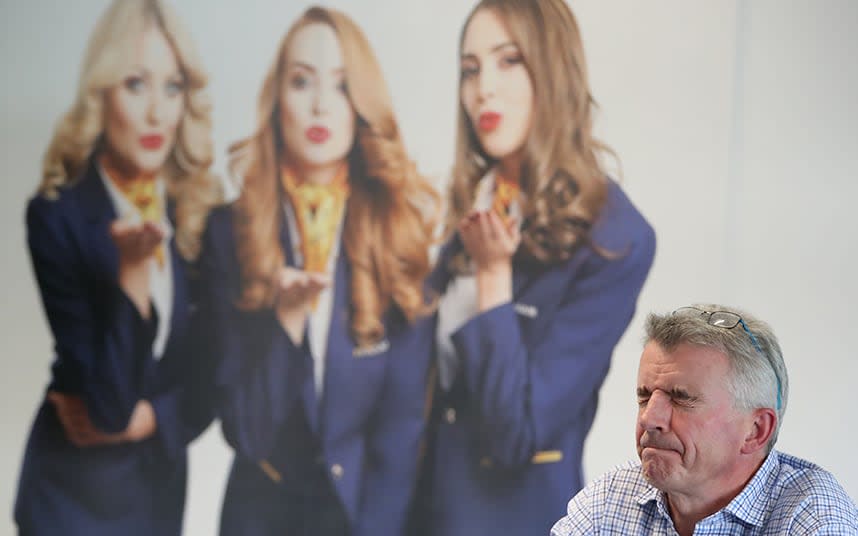Fear, musical chairs and the mile-long 'priority boarding' queue – welcome to the new Ryanair

Flying with Ryanair has never been simple. But after years of practice, we’d perfected the art. When it came to booking a flight you’d steadfastly refuse the extras – manually unticking the umpteen boxes. Airport parking? No thanks. Car hire? I don’t think so. Official Ryanair cabin bag? Jog on. It was a rather laborious process. A test I conducted in 2014 found that it took 20 mouse clicks to reach Ryanair’s payment screen (including one to decline an offer to play its “win your trip for free” game). But it was all done in autopilot – 20 judicious clicks and the cheap fare was yours. And for pity’s sake, spell your name correctly and don’t forget to print your boarding pass!
Furthermore, when it came to packing you knew where you stood. Cram your luggage into a carry-on case (maximum dimensions 55cm x 40cm x 20 cm), make sure it weighs less than 10kg, and you’ll be taking it on board free of charge – no questions asked.

At the airport things got a little complicated. Before the introduction of allocated seating, passengers were treated to Ryanair’s traditional pre-flight scrum. Families with young children boarded first, but for everyone else it was a grim battle to be at the front of the queue. “There’s no time for duty-free shopping, darling – get to the gate!”
The arrival of allocated seating, in February 2014, put an end to that silliness. All passengers were assigned a seat number (free of charge) during the booking process and (so long as you didn’t check in at the very last minute) everyone in your group would get to sit together.
Ryanair should have stopped there. In fact, I’d suggest that early 2014, immediately after the introduction of allocated seating, was Ryanair’s greatest hour. Skip the extras, stuff your case and put up with the slightly jarring in-flight experience, and you’ll be flown somewhere warm, on time, with minimal inconvenience. It wasn’t far off the perfect low-cost airline.
How things have changed. Since then, the airline has reinvented itself (in the name of “Always Getting Better”, we’re told). Ryanair 2.0 comes with a whole host of new hassles. If you’ve flown with them recently, the following should be familiar.
Fare wars | Who has the cheapest tickets in the UK?
The fear
For years Ryanair’s “random” seat allocation policy almost always permitted people on the same booking to sit together, even if they refused to pay extra. But something strange started happening in the summer of 2017. Tens of thousands of passengers suddenly found themselves split up from their loved ones, often in seats many rows apart. Social media was inundated with tales of woe. Our favourite? The party of 23 that was scattered across 23 different rows – with each person occupying a middle seat.
Ryanair insisted it had not changed its policy, and says seats are still assigned “randomly” (despite an analysis by an Oxford University statistician making nonsense of this claim), but for passengers the deduction was simple: pay extra or you will be punished. Ryanair is now using fear to sell extras. It isn’t an empty threat. I’ve flown with Ryanair a handful of times in the last year or so. I’ve never paid to choose a seat – and each time I’ve been split up from the rest of my group. “Remember, if you don't reserve a seat you will be randomly allocated one at check-in,” says my booking confirmation for an upcoming flight to Venice. I’m flying solo, so there’s no need, but if I was going with my girlfriend (a nervous flier) I’d have the fear – and only £4 per person per flight would banish it.
Top 10 | Airlines most reliant on extra charges
More fear – and the curious game of “hide the cabin bag”
In 2014 Ryanair had the bright idea of permitting passengers to travel with a second smaller carry-on bag (a handbag or laptop case, for example). Generous, on the face of it. But it created a colossal problem.
The subsequent influx of extra bags meant overhead lockers filled up far more quickly than before, forcing the airline to put dozens of carry-on cases in the hold. Previously, this issue existed. But the second bag policy seemed to turn a rare occurrence into a regular one. It also heralded the return of the pre-flight scrum. Previously passengers battled to be near the front of the queue so they could sit together. Now it was to ensure their cabin bag would be allowed in the cabin.
All that changed once again earlier this year. Never one to miss an opportunity, Ryanair realised it could convince more people to pay for priority boarding (currently as much as £7 per person per flight) if it came with a guarantee that your carry-on case would travel with you. Once again fear is being used - fear that your bag might be lost, fear that it will take an hour to reach the carousel at your destination - to sell extras.
Top 5 | Things you didn't know about Ryanair
The policy is enforced at the gate. Before boarding starts, Ryanair staff patrol the area armed with tags. If you’ve got a case you’re asked to show your boarding pass to prove you’ve paid the fee. If you haven’t, the tag goes on and your luggage will be taken by baggage handlers on the tarmac. If the roaming representative doesn’t get you, those scanning passports at the gate probably will. Nevertheless, I’ve watched passengers attempt to slyly avoid having their case tagged by slipping away from approaching representatives. Others will politely argue, usually in vain, that their hefty holdall will fit under the seat in front.
The backpack is king
The secret to avoiding separation from your hand luggage (and not paying for priority boarding)? My father has had success with point-blank refusal. “I must have my bag with me in the cabin,” he once told a slightly startled member of Ryanair’s cabin crew, leaving absolutely no room for negotiation. It only bleeding worked.
Those with less chutzpah should embrace the backpack. Whenever I fly Ryanair it is with a rucksack. Not a particularly small one, either. I reckon it carries more than many of the wheelie cases and holdalls that don’t survive scrutiny, but when it is on my back it looks compact – and, without fail, it is always allowed on board.
Europe's 10 largest airlines
Making a mockery of “priority boarding”
How can the airline still call it “priority boarding” when the “priority” queue is three times as long as the regular one? This was the case on a recent Ryanair flight to Bergerac. Watching people who had paid at least a fiver for so-called “priority boarding” join the back of a very, very long queue (clear evidence that the policy of fear is working well) did make me chuckle, but call it was it really is – a queue for those convinced to pay extra to travel with their bag.
I always detect just a hint of unspoken camaraderie among the last to board. The savvy folk who didn’t pay extra – and haven’t just spent 30 minutes standing in line. Well played, sir.
How Ryanair is taking over Europe
The delay
Ryanair has one of the better on-time performances (OTP) in the aviation industry. According to its self-reported data, 82 per cent of flights arrived within 15 minutes of their scheduled time in April 2018. In March the figure was 84 per cent. But there’s been a considerable dip in the last year or two. Between 2011 and 2015, 13 months out of 65 saw an OTP below 90 per cent. Since then it has been 18 months out of 28.
And this summer the problem has been even more pronounced, with air traffic control shortages in Europe apparently to blame.
My flight home from Bergerac was delayed by more than an hour, and Twitter is utterly awash with similar tales from recent months. So bad is the situation - and presumably the figures - that, since May, Ryanair has refused to publish punctuality data on its website for the first time in eight years (“N/A”, it says!). The delays might not be Ryanair’s fault, but that doesn’t mean they shouldn’t be on record.
Plane delays | The world's least punctual airlines
If it’s not cancelled, that is
By far the biggest of Ryanair’s recent problems, of course, has been unhappy staff. It has cancelled thousands of flights, many at very short notice, due to striking pilots in Ireland, Belgium, Sweden and Germany. This discontent has been brewing for some time. A fascinating Reuters report last year linked the ongoing row to 2017’s mass cancellations and so-called “rostering error”, and quoted a serving captain who said Ryanair’s pilots feel they are treated “like janitors”.
The in-flight musical chairs
For those separated from their travelling companions by Ryanair’s “random” seat allocation, a glimmer of hope remains – can you convince other passengers to swap? If you’re in row 3 and your partner is in row 23, it’s a no-go. But if just a few rows separate you then a complex series of consultations might begin. I proudly led one such arbitration last summer. No fewer than four parties were involved, each with the same goal – to avoid three hours surrounded by strangers. A tricky game of musical chairs ensued and all were satisfied. “You should be a professional negotiator,” quipped one witness.
And that’s it. Once the doors are locked a Ryanair flight is just like it used to be. If you’re not blinded by the yellow you can stare at the in-flight safety instructions on the seat in front, clutch your possessions because there’s no pocket in which to put them, eat an overpriced cheese-and-ham panini, and watch flight attendants half-heartedly hawk scratch-cards that nobody in history has ever purchased.
I don’t mean to be a Ryanair basher. I still fly with it regularly because it is the cheapest option out there. I merely wish to illustrate how it has got itself into such a tangle. What was easy to understand has become opaque. They say you don’t know what you’ve got till it’s gone, and I long for the return of the Ryanair vintage of 2014 – or, even better perhaps, another airline that can reliably match it for price.
Win a luxury holiday worth up to £80,000

